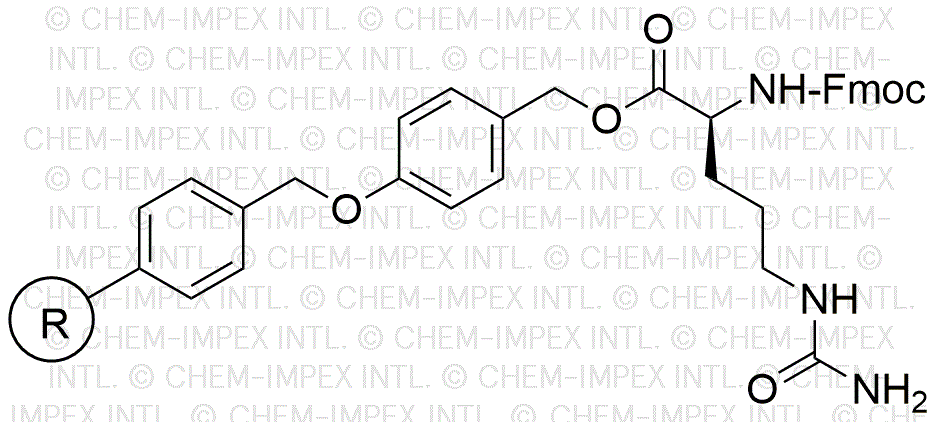Fmoc-L-citrulline 4-alkoxybenzyl alcohol resin is widely utilized in research focused on
- Peptide Synthesis: This resin is essential for solid-phase peptide synthesis, allowing researchers to create peptides with high purity and yield. Its stability and ease of use make it a preferred choice in laboratories.
- Drug Development: In the pharmaceutical industry, it aids in the development of peptide-based drugs, particularly those targeting specific diseases, enhancing the efficiency of drug discovery processes.
- Bioconjugation: The resin facilitates the attachment of peptides to other biomolecules, which is crucial in creating targeted therapies and diagnostics, enhancing the specificity of treatments.
- Research in Cancer Therapeutics: It is used in developing cancer-targeting peptides, contributing to innovative therapies that aim to minimize side effects while maximizing treatment efficacy.
- Custom Peptide Libraries: Researchers utilize this resin to create diverse peptide libraries for screening potential drug candidates, significantly speeding up the discovery of new therapeutic agents.
Informations générales
Propriétés
Sécurité et réglementation
Applications
Fmoc-L-citrulline 4-alkoxybenzyl alcohol resin is widely utilized in research focused on
- Peptide Synthesis: This resin is essential for solid-phase peptide synthesis, allowing researchers to create peptides with high purity and yield. Its stability and ease of use make it a preferred choice in laboratories.
- Drug Development: In the pharmaceutical industry, it aids in the development of peptide-based drugs, particularly those targeting specific diseases, enhancing the efficiency of drug discovery processes.
- Bioconjugation: The resin facilitates the attachment of peptides to other biomolecules, which is crucial in creating targeted therapies and diagnostics, enhancing the specificity of treatments.
- Research in Cancer Therapeutics: It is used in developing cancer-targeting peptides, contributing to innovative therapies that aim to minimize side effects while maximizing treatment efficacy.
- Custom Peptide Libraries: Researchers utilize this resin to create diverse peptide libraries for screening potential drug candidates, significantly speeding up the discovery of new therapeutic agents.
Documents
Fiches de données de sécurité (FDS)
La FDS fournit des informations de sécurité complètes sur la manipulation, le stockage et l’élimination du produit.
Spécifications du produit (PS)
Le PS fournit une description complète des propriétés du produit, notamment sa composition chimique, son état physique, sa pureté et les exigences de stockage. Il détaille également les plages de qualité acceptables et les applications prévues du produit.
Certificats d'analyse (COA)
Recherchez des certificats d'analyse (COA) en saisissant le numéro de lot du produit. Les numéros de lot et de lot se trouvent sur l'étiquette d'un produit, après les mots « Lot » ou « Lot de fabrication ».
Numéro de catalogue
Numéro de lot/série
Certificats d'origine (COO)
Ce certificat d'exploitation confirme le pays dans lequel le produit a été fabriqué, et détaille également les matériaux et composants utilisés et s'il est issu de sources naturelles, synthétiques ou autres sources spécifiques. Ce certificat peut être requis pour les douanes, le commerce et la conformité réglementaire.
Numéro de catalogue
Numéro de lot/série
Fiches de données de sécurité (FDS)
La FDS fournit des informations de sécurité complètes sur la manipulation, le stockage et l’élimination du produit.
DownloadSpécifications du produit (PS)
Le PS fournit une description complète des propriétés du produit, notamment sa composition chimique, son état physique, sa pureté et les exigences de stockage. Il détaille également les plages de qualité acceptables et les applications prévues du produit.
DownloadCertificats d'analyse (COA)
Recherchez des certificats d'analyse (COA) en saisissant le numéro de lot du produit. Les numéros de lot et de lot se trouvent sur l'étiquette d'un produit, après les mots « Lot » ou « Lot de fabrication ».
Numéro de catalogue
Numéro de lot/série
Certificats d'origine (COO)
Ce certificat d'exploitation confirme le pays dans lequel le produit a été fabriqué, et détaille également les matériaux et composants utilisés et s'il est issu de sources naturelles, synthétiques ou autres sources spécifiques. Ce certificat peut être requis pour les douanes, le commerce et la conformité réglementaire.


